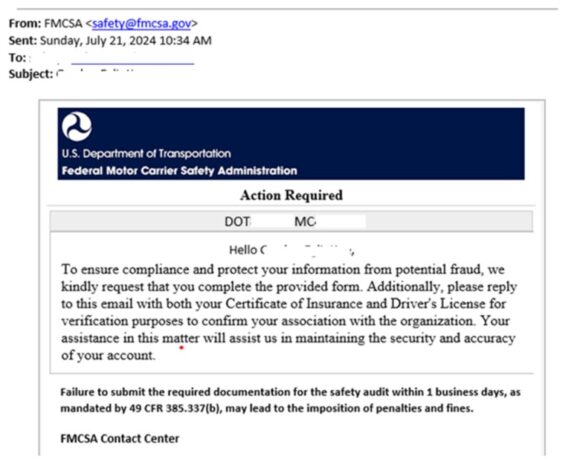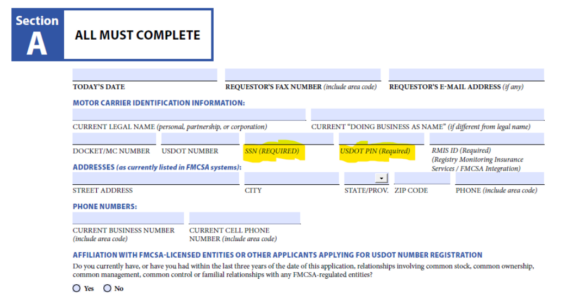This post is part of a series sponsored by IAT Insurance Group.
The Federal Motor Carrier Safety Administration (FMCSA) Issued a warning About the sophisticated phishing scam targeting delivery companies. Fraudulent emails, Pretending to be official correspondence Emails from the FMCSA are being sent to registered organizations with the intent of extracting sensitive information.
The emails are designed to look legitimate, including FMCSA logos and formatting that mimics real correspondence, but the content and information requested are clear red flags to those in the know.

Example of a phishing email
Scam Details
The phishing emails in question ask carriers to fill out an attached registration form that goes beyond the usual requests, asking for personal information such as the carrier’s Social Security number, Department of Transportation Personal Identification Number, RMIS ID, and in some cases, cynically under the guise of “fraud prevention,” carriers are also asked to upload copies of their insurance policies and driver’s licenses.

Do not fill out this form.
Recognizing Warning Signs
FMCSA emphasizes that it will never request such sensitive information through an email form. Official communications from FMCSA regarding requests for information will either instruct you to log into your portal account or be sent directly from an FMCSA-only mailbox. Additionally, legitimate emails from FMCSA will be sent from official FMCSA email addresses and never from any of the suspicious addresses currently being used for these fraudulent requests. safety@fmcsa.gov or To submit to: fmcsa.gov.
Also, for biennial updates, please refer to the official FMCSA website. Trucking companies are required to update their information every two years based on the last digit of their DOT number. If there are any changes, such as a larger or smaller vehicle, please update your MCS-150 on the FMCSA website. only Please download and fill out the form from the official .gov website, otherwise it will affect your CSA score and make you non-compliant.
It is important to always be vigilant and check any suspicious emails that appear to be from FMCSA or any other agency. If you receive an email requesting personal information or threatening to cancel your USDOT number if you do not comply within 24 hours, it is a scam. FMCSA or any other US agency does not operate in this manner.
5 tips to protect yourself from phishing scams
Here are five best practices to help protect yourself and your business from phishing scams.
- Check the source of the email. Be sure to check the sender’s actual email address – you can hover over it to see the full address. This will help you identify where the email is coming from and determine if it’s legitimate.
- Do not click on suspicious links or download attachments. Similarly, if an email contains a link, hover your mouse over it to see where it leads before you click. If the URL looks suspicious, don’t click it.
- Note the urgency. Phishing emails often create a sense of urgency and encourage you to take action immediately. Be wary of emails that threaten severe action if you don’t respond within a short period of time.
- Do not share personal information via email. Never provide personal or sensitive information in unsecure email communications. A public agency, such as the FMCSA, will never ask you for account numbers, passwords, Social Security numbers, USDOT PINs, credit card details, copies of bills, or other personal information in an email form, unsolicited text message, phone call, or fax. If you receive such a request, it is a scam.
- Report suspicious emails. If you receive a suspicious email, report it immediately to FMCSA or your IT department. This will help prevent others from falling victim to the same scam.
Why now? New FMCSA site login requirements cause confusion
In response to the President’s multi-factor authentication mandate, FMCSA has begun a transition to Login.gov in 2024 to enhance online safety and security. With this transition, all users with FMCSA system credentials will be required to access FMCSA systems using their Login.gov account instead of using their DOT PIN.
As of January 1st, Learn more It’s the only way to access the FMCSA portal and the consolidated registration system, but during this transition period, phishing scams are targeting truckers who may be confused by the new system.
You must use the Federal Portal via Login.gov to log in. Your FMCSA PIN is no longer valid for system access. Request a new login through Login.gov, select who is responsible for the login, and complete the verification process by pressing the “GO” or “SMS” button depending on which system you are accessing.
Contact Loss Control
Have questions about how to mitigate your risks? Email us losscontroldirect@iatinsurance.com Here’s your chance to see your question answered in an upcoming blog.
Nancy Ross Anderson
topic
Trucking
Interested in Trucking?
Get automated alerts on this topic.







